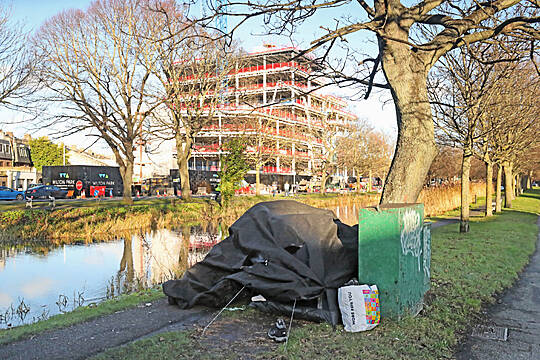There is a very strong justification to extend the blanket ban on evicting tenants after the pandemic, an expert in homeless policy has said.
Professor Eoin O’Sullivan, a researcher at Trinity College Dublin, said the emergency protections for renters has made a significant difference in the number of families entering emergency accommodation.
The Government brought in an emergency ban on evictions and a freeze on rents at the outset of the pandemic. The moratorium has been extended until early March, in line with Level 5 Covid-19 restrictions.
At the end of December 2020, there were 755 families in emergency accommodation. This is the lowest monthly figure since December 2015.
The figure represents a total decrease of 446 families since the start of 2020 when there were 1,201 families in emergency accommodation.
Prof O’Sullivan, who has published material on homelessness issues, appeared before the Oireachtas housing committee.
He said: “In terms of the moratorium – I think a number of people made the suggestion before Covid that we needed a period of time to slow down the flow of households into emergency accommodation, and that required rebalancing the rights of landlords and tenants.
“I suppose it was hypothesis at that stage – would it make a difference?
“We now know, because of Covid, the evidence is that it has made a very significant difference, and particularly for families, less so for singles.
“We can stop the flow, the extraordinary flow, every day into emergency accommodation. I do think we now have very clear evidence that it has worked.
“If it is to end on March 5th, well I think there’s a very strong justification for extending it, irrespective of Covid, just to say we need an extension of that moratorium.”
Figures show that the number of children residing in emergency accommodation at the end of December 2020 was 1,864.
This has been reducing steadily since September 2019, when the figure was 2,872. It also represents a decrease of 814 since the start of 2020.
At the end of 2020 there were 181 families residing in hotel facilities, the lowest monthly figure since September 2014.
The highest figure was in March 2017 when it reached 871.
Professor O’Sullivan added: “Ending homelessness is possible but it will not be achieved through charity, compassion or caring, or through sleep-outs, shelters or soup.
“Homelessness can be ended through the large-scale provision of state-funded social housing tenancies provided by both local authorities and AHBs (approved housing bodies), with sustainable streams of funding and eliminating the current disincentives to maintaining and retaining the stock.”
Alice Leahy, director of services at the Alice Leahy Trust, told the committee that homelessness must be looked at from at least two angles.
“The structural causes due to lack of housing which can be eased by increased housing supply – this is the simplest of the two,” she added.
“The social and personal issues that can lead to homelessness are much more complicated and require early intervention if we are to halt the slide of vulnerable human beings onto our streets.
“The people we meet who present as homeless have myriad of social problems related to the complexity of their own personal and unique human condition.
“Inter-generational poverty relating to poor finance and education, absence of opportunity to work or have a stake in society, all combine to undermine the person.”
Meanwhile, Fianna Fáil Senator Mary Fitzpatrick said that concentrating emergency accommodation in one area is “ghettoising” homeless people.
She said that seven hostels have been set up on North Frederick Street in north Dublin in the last six months.
“They’re privately [owned] and they’re operated by bouncers and some security personnel,” she added.
“That’s a street that was lived in by [Constance] Markiewicz and Harry Clarke, and Oliver Saint John Gogarty, it’s an historic street, less than 500 meters from the O’Connell Street.
“I think by concentrating all of these people in these accommodations, it’s ghettoising people who are homeless, it’s people who had been getting on with their lives.”
Brendan Kenny, deputy chief executive of Dublin Regional Homeless Executive, said there was a crisis in seeking private emergency accommodation.
“Suddenly Covid really, really worsened that crisis,” he told the committee.
“We actually emptied some of the hostels in the city, totally.
“We had to thin out most of the hostels for social distancing purposes and had to very quickly acquire hostels in the city, otherwise more people would be dying on the streets and more people will be sleeping on the streets.
“We’ve managed to only have three deaths from Covid. Our only option was to go out and source accommodation in the private sector.”







